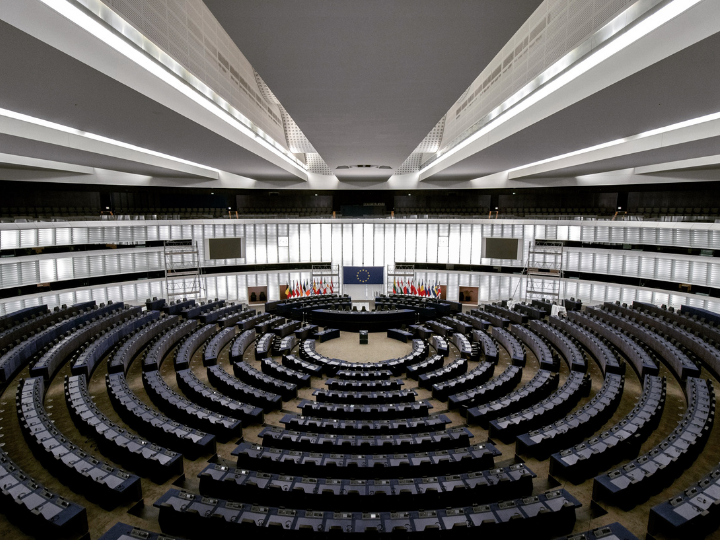by Alexandra Brzozowski and Benjamin Fox
Short of spelling it out in technicolour behind her podium, Ursula von der Leyen could hardly have been clearer about her intention to seek a second term as European Commission president as she delivered her last annual speech in Strasbourg.
The speech – delivered before a stern audience of several hundred European Parliament lawmakers – was also a lesson in how to make an ambitious political spiel without for a moment looking pretentious or out of place.
It was probably the most telling moment of the whole address when von der Leyen looked up from her script, addressing “Honourable Member States” rather than the “Honourable Members (MEPs)” in front of her.
A slip of the tongue, followed by what some might have interpreted as a guilty smile, underlined what this speech was effectively about: a veiled pitch for a second term, which member states rather than EU lawmakers will decide on.
The first stanzas of her last SOTEU before next year’s European elections in June were pure electioneering: a tribute to the Commission’s purported policy successes in responding to the COVID pandemic, the fallout of Russia’s war on Ukraine, and driving the European Green Deal.
But first and foremost, it took the US style of touting domestic successes and challenges over external affairs triumphs. Just like across the pond, European elections are rarely won based on foreign policy achievements.
The trickiest and most technical policies, such as the prospect of EU enlargement and reforms to the EU treaties, were dealt with at the end, almost as an afterthought. After all, very few outside the EU bubble will have their vote dictated primarily by EU institutional questions.
The late mention of Russia’s war in Ukraine, compared to the total dominance of the war in last year’s edition, may not be a complete surprise. Especially when thinking about the creeping ‘Ukraine fatigue’ that is increasingly becoming visible here and there across the bloc.
But migration is arguably the number one issue for Europeans right now, and one where politicians from the political mainstream are anxious to fend off nationalist and far-right parties and keep the issue on the mainstream policy lane.
EPP leader Manfred Weber wants his centre-right party, of which von der Leyen is a member, to prove to voters that they are listening and delivering results on migration control.
The EU’s new pact with Tunisia, brokered by von der Leyen with Tunisia’s authoritarian president Kais Saied in July, has been nothing if not a pragmatic response to voters’ concerns ahead of next June.
Yet the Commission president did not mention this – or her plans to agree similar deals with other North African states in the coming months – until the later stages of her speech.
With the speech out of the way and the bell ringing for the last round, the question is, what happens next?
In practice, the EPP’s statute requires it to hold a primary to select a Spitzenkandidat ahead of next June. And von der Leyen, therefore, needs to formally decide whether she wants a second term in the coming weeks.
Weber, meanwhile, who did not look as though he had truly enjoyed von der Leyen’s speech – or, for that matter, his own intervention praising the ‘von der Leyen majority’ that he had to deliver – will also have to decide whether he wants to run.
By far, the most likely outcome is that von der Leyen runs unopposed for the EPP nomination, with the other parties going through similar motions of selecting (several) lead candidates.
The big question looming over EU leaders before and after the summer break was whether von der Leyen actually wanted a second term.
Now, it appears, we have a clear answer.
*first published in: Euractiv.com




 By: N. Peter Kramer
By: N. Peter Kramer
